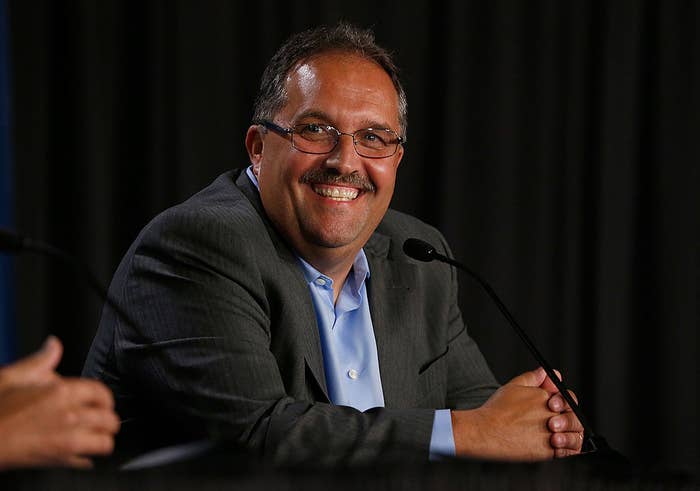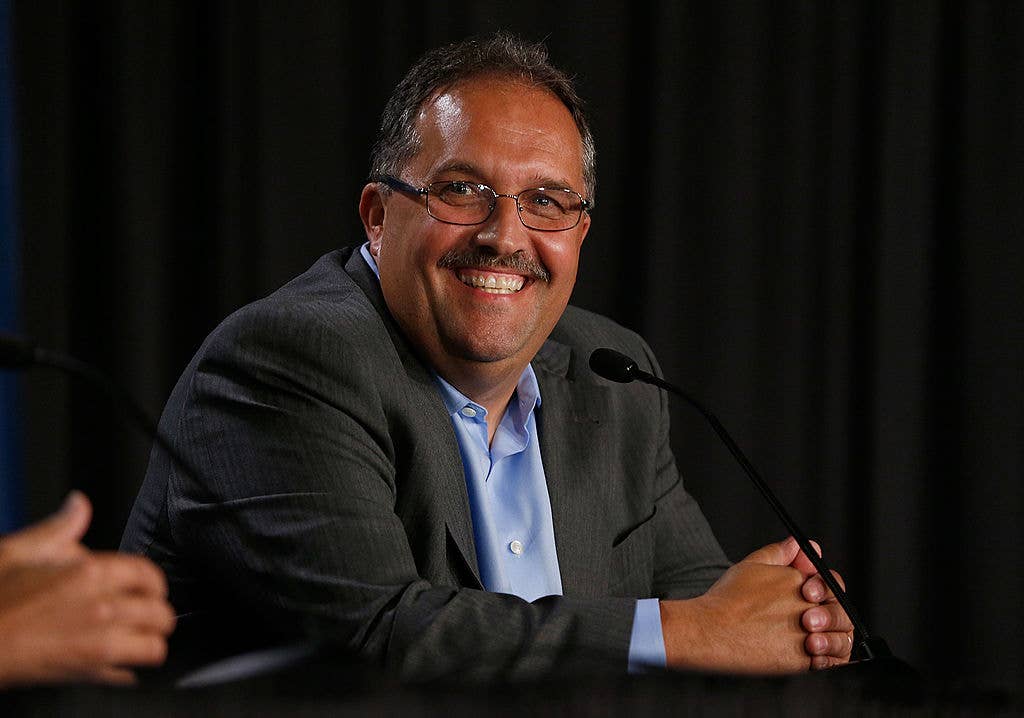
Stan Van Gundy spent these past few months, like many people, reevaluating what matters. Talking with his wife, the man who spent 12 years as an NBA head coach, including leading the Magic to the NBA Finals in 2009, wondered whether he should use social media to speak on issues he cares about. Three weeks ago, Van Gundy joined Twitter and has since the Turner NBA analyst has been using his social media platform to amplify messages about social justice, the importance of voting, and wearing masks in public.
When the season restarts Thursday, Van Gundy will be traveling into the bubble to call a series of regular-season and playoff games, including Thursday’s opener between the Pelicans and Jazz for TNT on Thursday
Earlier this week, we chatted with Van Gundy about why he doesn’t check his Twitter mentions, his thoughts on Dwight Howard questioning the need to wear masks in the NBA bubble, the biggest challenge for players over the next three months, what he is most excited to see when NBA basketball resumes, and more.
(This interview has been edited and condensed for clarity.)
What’s been the best and worst part of being on Twitter?
The best part is reading tweets from other people that I have a lot of respect for. It’s been a good learning experience. There’s been no worst thing. One thing I decided right at the beginning was I wasn’t going to read any of the comments. They can comment, they can say what they want, they can call me names. I’m not even going to see them let alone respond to them.
So, you’re already being a smart Twitter user.
I’m not going to get involved in Twitter wars. I’m going to say what’s on my mind and that’s it. People can comment any way they want, they can agree or disagree, but I’m not going to go through looking for them in my comments.
Do you have a favorite NBA meme now that you’re online. Maybe the Michael Jordan crying face, or Alonzo Mourning having a moment of enlightenment while shaking his head on the bench.
I’m not technological enough to even understand any of that stuff.
Have you been inspired seeing players and coaches in NBA circles—Steve Kerr and Gregg Popovich being the most obvious example—use their voice and platforms?
I’ve always spoken out. I’ve always had things to say politically and never been afraid to express my opinion, so I don’t know if they’re the reason I’m speaking out now. But I am constantly inspired by coaches, particularly right now, and what a lot of NBA head coaches are doing in their communities to promote racial justice and better policing. I’m also really inspired by players in all sports. I’ve been involved with the Players Coalition, which was started by NFL players. The reason I’m so inspired by what these athletes are doing is because I think most of us speak out more and get more involved as we get older. This is not something that I was doing very much of, if at all, in my 20s and 30s. I have great respect for young people in this country who are seeing problems and using their platform to speak out. I’m also inspired by our progressive leaders like Alexandria Ocasio-Cortez, Ayanna Pressley, Elizabeth Warren, and Brenie Sanders.
Are you optimistic about the future?
I’m not sure that I am. I go back and forth. Young people are the only source of optimism I really have. Unfortunately, particularly in matters of racial justice, my generation and the generations before us have dropped the ball big time. I don’t have faith in a good number of our elected leaders to make the changes we need. But I do have great optimism that things will change as younger people come into power and the next generation takes over. That’s not to say there aren’t people my age or older who are committed to economic justice, racial justice, and criminal justice reform. But on the whole, we haven’t moved things forward, especially as white people, in our generation. We’ve just kicked the can down the road and stuck our kids with these problems, but I do think they’re up to the task.
When you were an NBA head coach, being in a predominantly black league, did you have a lot of conversations with your players about social and political issues, and about their upbringings which in many cases was probably much different from yours?
That was certainly a huge part of my education in terms of racial issues. Certainly I’ve read a lot, but the biggest part of my education in terms of what’s been going on in this country has been people I’ve worked with, and not just players, but also staff members. Just hearing their own stories, their own experiences, their family’s experiences, the communities they grew up in and the things that are still going on in those communities. These are things that they, as relatively wealthy people in our society, are still going through, because they are people of color and this is the discrimination they face. Those things were really eye opening to me. I think when people you care about, and people you work with, people that you like and respect, when they are being treated poorly, I think it’s something any of us would care a great deal about.
One of the messages you’ve been spreading on Twitter is the importance of wearing masks. What did you think when you hear someone like Dwight Howard using his own platform to question the need to wear a mask in the NBA bubble and to talk about how he doesn’t believe in vaccines?
Everybody has the right to express their own opinions. I believe in freedom of speech, almost completely. But I also believe that people have the right to make their own decisions up until the point that it impacts other people.
If you’re a Christian Scientist and you don’t want to get medical care, to me that’s your right. But when you decide not to vaccinate your kids and they’re going to be in a classroom with my kids and increase the chance of my kids getting a communicable disease, or if you don’t wear a mask and that increases your chances of spreading COVID-19 to other people, I think your rights end at that point.
Dwight is certainly entitled to his own opinion, but I certainly don’t agree with it. We have the responsibility to take care of each other and the government has every right to mandate things that lead to public safety. You shouldn’t have the right to do things that negatively impact other people.
"I hear this all the time, that these guys make a lot of money. Well, the money isn’t doing them any good while they’re sitting in the bubble. They can’t do anything. That lack of freedom and lack of contact with your loved ones is going to wear on the players more and more. I think we’re going to run into some players who get to a point where they just can’t take it anymore."
What do you think will be the toughest challenge for NBA coaches in the bubble?
Just getting their whole team on a court together. There aren't very many teams with a full complement of guys right now. I think the biggest challenge is going to be off the court. Out of necessity, we have taken away these players’ freedoms. They literally can’t do anything. The only people they interact with are teammates and other players. Their off court options are very limited. They are away from family, friends, girlfriends, wives—this is very difficult.
I hear this all the time, that these guys make a lot of money. Well, the money isn’t doing them any good while they’re sitting in the bubble. They can’t do anything. That lack of freedom and lack of contact with your loved ones is going to wear on the players more and more. I think we’re going to run into some players who get to a point where they just can’t take it anymore. This is a huge challenge to players, coaches, and everybody, to try to stay mentally engaged in what’s going on basketball wise, when you don’t have anything else in your life for up to three months.
Is there a particular team you’re really excited to see in this bubble environment?
It’s not really one team. I’m more eager to see how the games will play out in this totally new environment. Our fans are really important, beside the fact that their support pays all our bills, they provide energy and emotion in the building, and players are very energized when the crowds are loud. I know these scrimmages are probably not the best indication because guys are still rounding into shape, but I think the intensity that comes from those emotions are way down so far. I want to see if that continues.
Has it been a difficult adjustment going from being an NBA head coach and now being on the media side?
Absolutely. It’s something entirely new. This is the first year I’ve actually done NBA games. It’s been a brand new challenge for me. I find it a hard thing to do and something I need to work at to get better. I hope I’m starting to improve a little bit game by game. It’s just the ins and outs of broadcasting: making your points concisely, hitting the important points in a timely manner, not stepping over your play-by-play guy, all of those things are really difficult to me. When I watch people like my brother [Jeff Van Gundy], he makes it look easy. It sounds like he’s just having a conversation with Mike Breen. When you’re new at it, it’s not like that at all. It’s really, really difficult. But I’ve had the good fortune of working with Ian Eagle who is not just one of the best in the business, but a willing mentor.
I assume working with Ian Eagle is making the transition at least a little easier.
He makes you look good. I think that’s the one thing he prides himself on. We always talk about players who make their teammates better, whether it is LeBron James, or whoever it is, and that’s Ian. He takes great pride in not just his own performance, but in taking an inexperienced announcer like me and making me better. Working with somebody so good, I do feel the pressure to try to rise at least halfway to his level. There’s times during games when I screw up and I speak over him, and I’m doing that to one of the absolutely best people in the business, and that’s tough.
Now that you’ve had some experience on the media side, do you think we spent too much time talking about things that happen off the court? The best example I have is we spend way more time speculating about Giannis Antetokounmpo’s free agency versus talking about how great this Milwaukee Bucks team is.
If I had my preference, we would focus exclusively on the game and on what’s happening on the court, and analyzing what’s going on there and talking about what we expect to see on the court. At the same time, the media’s job is to be a voice for the fans, and to give the fans the information they want, and in my experience, people are extremely interested in free agency. Personally, it drives me crazy. But I know from talking to people that they love that stuff. I think the media would be wrong if they didn’t delve into free agency because that’s the thing fans want to hear about.

